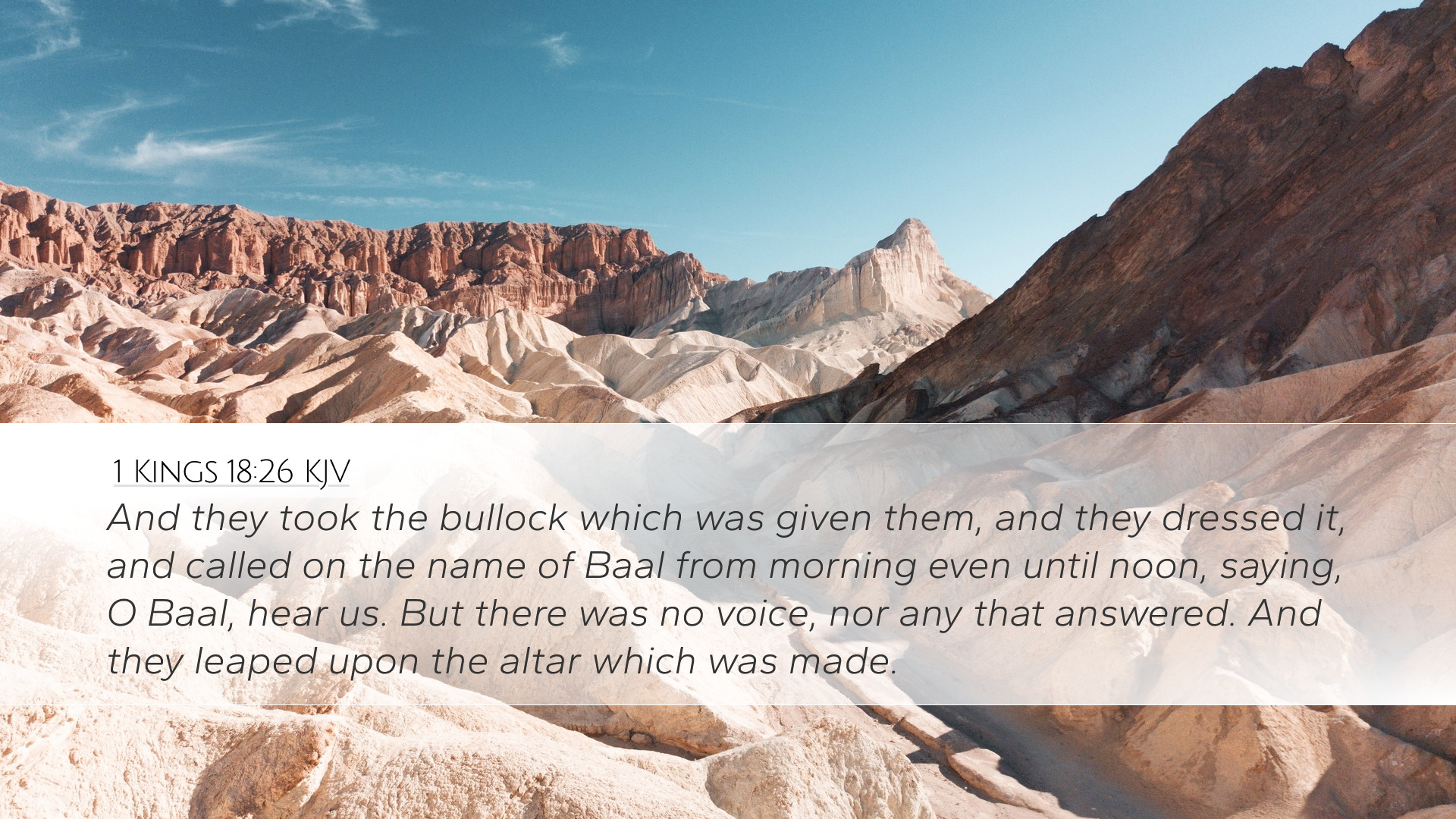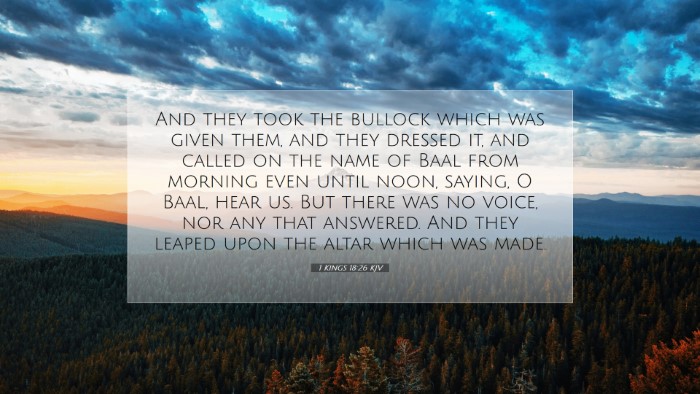Commentary on 1 Kings 18:26
Verse Reference: 1 Kings 18:26 - "And they took the bullock which was given them, and they dressed it, and called on the name of Baal from morning even until noon, saying, O Baal, hear us. But there was no voice, nor any that answered. And they leaped upon the altar which was made."
Introduction
The confrontation between the prophet Elijah and the prophets of Baal on Mount Carmel is one of the most dramatic narratives in the Old Testament. This verse encapsulates the fervent attempts of the prophets of Baal to invoke their god, illustrating key themes of idolatry, the futility of false worship, and the sovereignty of the one true God. The analysis from various public domain commentaries provides deeper insights into the cultural and theological implications of this passage.
Contextual Background
The historical context of 1 Kings 18 reveals a nation divided in faith under King Ahab, who promoted the worship of Baal, a Canaanite deity associated with fertility and rain. The Israelites faced a severe drought as a direct consequence of their sinfulness, highlighting the stark contrast between the false gods and the living God.
Role of Elijah
Elijah stands as a bold prophet of Yahweh, confronting the rampant idolatry among the people. His confidence in God's power is evident as he invites the prophets of Baal to a test to prove whose deity truly holds authority over Israel's fate.
Analysis of the Prophets of Baal's Actions
The actions of the prophets of Baal, described in 1 Kings 18:26, serve as a primary focus for interpretation:
-
Preparation of the Sacrifice:
The preparation of the bullock emphasizes the ceremonial nature of worship and the expectation of divine response. The meticulous dressing of the bullock indicates their dedication to the ritual.
-
Calling on Baal:
From morning until noon, the prophets engage in a futile exercise of fervent prayer and chanting. The duration of their cries underscores their desperation and the expectation that a deity should respond to such devoted efforts.
-
The Irony of Silence:
The absence of any response from Baal is a critical moment. As Matthew Henry points out, one implication is that their fervor fails to elicit any reaction, illustrating the impotence of false gods. This emphatic silence contrasts sharply with the living God, who hears and answers prayers.
-
The Leaping Upon the Altar:
Modern commentators like Albert Barnes highlight the leaping as a sign of desperation and the extremity of their religious fervor. It symbolizes the lengths to which they were willing to go to manifest their faith—yet only to reveal its emptiness.
Theological Implications
This narrative sets up a critical theological discourse about the realities of worship and the nature of God:
-
The Nature of True Worship:
True worship is marked by sincerity and aligns with the truth of God's nature. In contrast, the efforts of the prophets reveal that external displays of zeal do not equate to genuine piety.
-
God's Sovereignty:
This event underscores the sovereignty of Yahweh over all creation, contrasting the impotence of Baal. Adam Clarke notes that God’s authority not only includes answering prayer but controlling natural elements. The drought symbolizes His judgment yet anticipates His intervention.
-
Challenge of Idolatry:
This narrative serves as a rebuke to idolatry. Idols produced by human hands are unable to act or respond, unlike the active engagement of the true God. This theme resonates throughout Scripture, challenging believers to evaluate their own practices and beliefs.
Application for Modern Readers
The themes and lessons found in this account are profoundly applicable to contemporary faith communities:
-
Discernment in Worship:
Modern believers are called to exercise discernment against the backdrop of secular ideologies and false teaching. The fervent dedication of the prophets of Baal serves as a cautionary tale against misplaced devotion.
-
Expectation of Divine Engagement:
The expectation that God hears the cries of His people should encourage earnest, sincere prayer. Unlike Baal, who remains silent, God invites His children to call upon Him with the confidence that He listens and responds.
-
Reflective Worship:
In a culture often characterized by noise and distraction, this passage calls for reflection on our worship practices. Are they ritualistic and performative, or do they stem from genuine relationship and reverence for God?
Conclusion
The account in 1 Kings 18:26 serves not only as a historical narrative but also as an instructive lesson for all ages. By understanding the desperate attempts of the prophets of Baal alongside the profound silence of their god, modern readers are reminded of the necessity of authentic faith. True worship demands a response from the human heart towards the living God, who alone reigns supreme.


